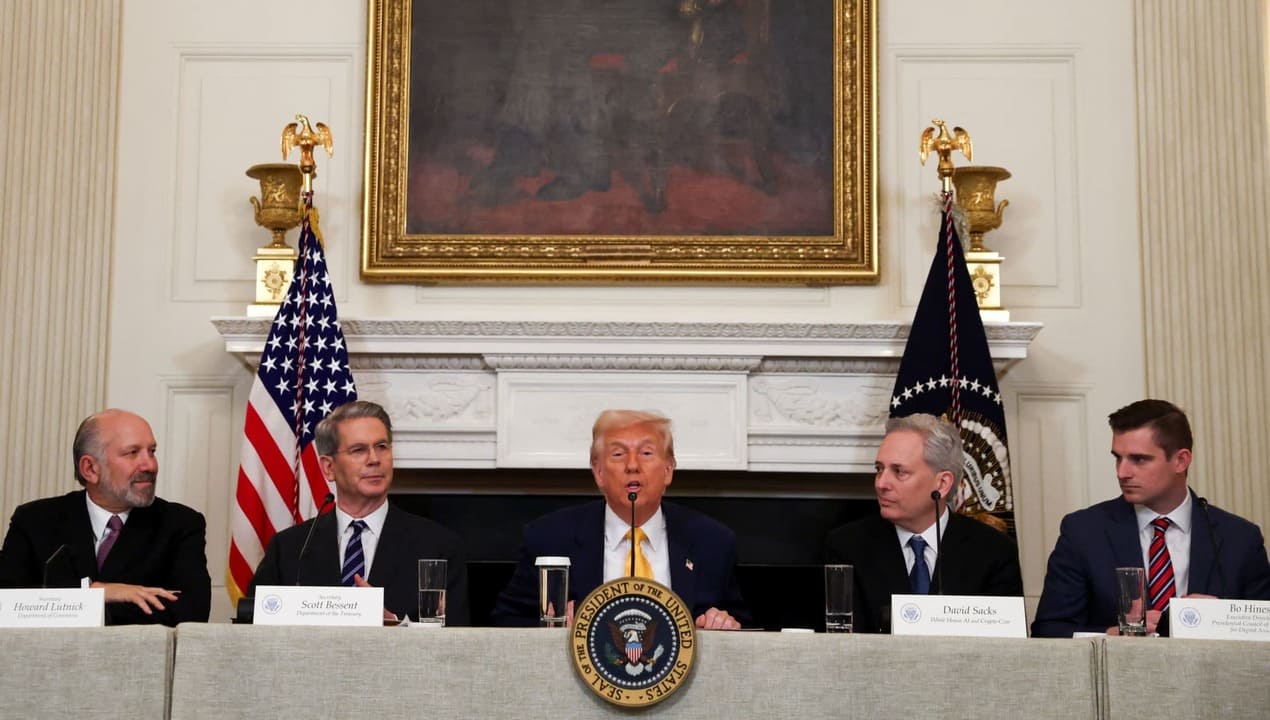
Independent Report – Bo Hines, who served as the head of President Donald Trump’s Council of Advisers on Digital Assets at the White House. Announced on Saturday that he will step down from his position and return to the private sector. His exit marks the conclusion of an important phase in the administration’s cryptocurrency policy development.
Hines played a leading role in shaping the White House approach to digital assets. Just weeks prior to his resignation, he spearheaded a cryptocurrency working group made up of senior administration officials. Which issued a detailed policy framework for U.S. cryptocurrency regulation.
The formation of the working group itself was the direct result of an executive order signed by President Trump shortly after taking office in January. This order instructed the administration to assemble a team dedicated to developing new guidelines for cryptocurrency markets. It was part of Trump’s broader campaign pledge to modernize U.S. financial regulations and position the country as a leader in blockchain innovation. By creating a specialized council, the administration sought to address regulatory uncertainty and foster greater investment in the crypto sector.
In a statement shared on the social media platform X, Hines expressed deep gratitude for the opportunity to serve. “Serving in President Trump’s administration and working alongside our brilliant AI & Crypto Czar, David Sacks. As Executive Director of the White House Crypto Council has been the honor of a lifetime,” he wrote. The message reflected both his pride in the work accomplished and his respect for colleagues who collaborated on advancing the nation’s digital asset strategy.
Also Read : Fried Rice as the ‘Fuel’ for EXO’s D.O. Concert in Jakarta
David Sacks, the White House’s chief adviser on artificial intelligence and cryptocurrency. Responded publicly to Hines’ announcement, praising his dedication and leadership. Sacks has been a vocal supporter of integrating emerging technologies into the U.S. economy while ensuring they are governed by clear and balanced rules. His endorsement underscores the significance of Hines’ contributions to the administration’s policy goals.
Hines is no stranger to the political arena, having previously run for a congressional seat in North Carolina on two separate occasions. Though both campaigns were unsuccessful. His political background, combined with his work in digital asset policy. Positioned him uniquely to bridge the gap between technological innovation and legislative priorities. His transition back to the private sector raises questions about his next role. Though it is likely he will remain involved in the cryptocurrency or technology space.
One of the administration’s recent milestones in the digital asset field occurred last month when President Trump signed legislation establishing a regulatory framework for stablecoins—cryptocurrencies designed to maintain a fixed value by pegging to the U.S. dollar. This new legal structure aims to create trust and stability in a market often criticized for volatility. Supporters believe it could pave the way for stablecoins to become a common method for everyday payments, enabling faster, cheaper, and more secure financial transactions. Critics, however, caution that even stablecoins carry risks if not properly managed, including potential systemic effects on the broader economy.
Hines’ departure comes at a time when the U.S. cryptocurrency sector stands at a crossroads. With ongoing debates about the role of government oversight in an industry that prides itself on decentralization, the absence of a key policy figure could influence the pace and direction of future regulatory developments. While the administration has made clear its intent to support innovation, it must balance this with investor protection, anti-money laundering measures, and the prevention of financial crimes.
The legacy of Hines’ tenure will likely be measured by the foundational work he helped establish for America’s digital asset ecosystem. By engaging policymakers, regulators, and industry leaders, he contributed to shaping a more defined and transparent path forward. His leadership in initiating dialogue between government agencies and the private sector may prove to be a lasting influence, even as the White House prepares to appoint his successor.
As Hines returns to the private sector, the administration faces the task of ensuring continuity in its crypto policy agenda. The groundwork laid by the Council of Advisers on Digital Assets could serve as a blueprint for future reforms, helping to integrate blockchain technology more fully into the U.S. financial infrastructure. For now, Hines leaves behind a role that placed him at the intersection of technology, regulation, and national economic strategy—a position that will continue to shape the evolving landscape of American cryptocurrency policy.
Also Read : DOJ Launches Inquiry Into NY Attorney General Over Trump Cases